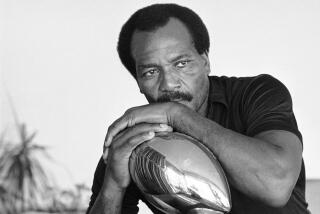Himan Brown dies at 99; pioneer symbolizes ‘an entire era of dramatic radio entertainment’
- Share via
Himan Brown, the pioneer radio producer and director of “Grand Central Station,” “Inner Sanctum Mysteries” and other popular shows of the 1930s and ‘40s who returned to the airwaves three decades later with “ CBS Radio Mystery Theater,” has died. He was 99.
Brown died Friday of age-related causes at his longtime apartment on Central Park West in Manhattan, said his granddaughter Melina Brown.
In a career in radio that began in the medium’s infancy in the late 1920s, the prolific Brown’s credits include “The Adventures of the Thin Man,” “Bulldog Drummond,” “Dick Tracy,” “Flash Gordon,” “The Adventures of Nero Wolfe,” “Terry and the Pirates” and many others.
Along the way, he directed stars such as Orson Welles, Helen Hayes, Edward G. Robinson, Mary Astor, Boris Karloff and Peter Lorre.
“He was one of the great storytellers of the heyday of the golden age of radio,” said Ron Simon, curator of television and radio at the Paley Center for Media in New York City. “He symbolized an entire era of dramatic radio entertainment.”
Brown may be best remembered for creating “Inner Sanctum Mysteries,” which debuted in 1941 and ran until 1952. The show’s opening featured one of the most famous sound effects in radio history: an eerie creaking door.
“That great sound effect just gave you a sense of mystery and suspense, symbolizing Hi Brown’s flair for the dramatic,” Simon said.
Long after the rise of television, Brown returned to radio to produce and direct the Peabody Award-winning “CBS Radio Mystery Theater,” which ran from 1974 to 1982.
“I knew that the kind of thing radio drama had, that one-to-one relationship with the listener, was always going to be there,” Brown told The Times in 1974. “It is the most personal form of the media arts, just you and the speaker. There’s imagination, a whole world of creation opening up. I believe a whole generation simply lost the ability to listen. We’re trying to get that back.”
The son of Jewish immigrants from the outskirts of Odessa in what is now Ukraine, Brown was born July 21, 1910, in the Brownsville section of Brooklyn.
Brown, whose father was a tailor, spoke only Yiddish until he entered public school. He joined a dramatic club at the Brooklyn Jewish Center as a child and appeared in revues at resorts in the Catskills as a teenager.
In a 2003 interview with the New York Times, Brown said he was a student at Boys High School when a shop teacher told him: “There’s a new thing now, radio.”
To be able to hear a Cincinnati radio station in Brooklyn over a crude crystal set, he said, was a “revelation.”
Brown entered Brooklyn College at 16 and had graduated from law school by the time he was 21. But, thanks to radio, he never practiced law.
While still a teenager, he began reading a humorist’s weekly newspaper essay over the air in a Yiddish dialect. Actress Gertrude Berg heard him and asked him to play husband Jake opposite her Molly Goldberg in a new radio show she was writing about a Jewish family in New York.
Brown became Berg’s partner and, he later said, it took him more than a year to sell “The Rise of the Goldbergs” to NBC, where it debuted in 1929. Later known as “The Goldbergs,” the classic show had a long run on radio before moving into television.
After several months, Brown later recalled, Berg gave him $200 and told him to “get lost.”
But that was just the beginning for Brown, who began selling other shows to advertising agencies, including “Little Italy,” a family show in which he played the father. He also began buying the rights to “Dick Tracy,” “The Gumps” and other popular comic strips.
Brown, who brought “Inner Sanctum” to television for a short run in 1954, also produced a couple of movies and bought an old movie studio in New York for television production in the ‘50s.
But he never lost his love for radio, and he produced radio dramas that were broadcast from Brooklyn College’s small AM radio station into his 90s. He was inducted into the Radio Hall of Fame in 1990.
“For me, the imagination is always more powerful than any movie star or scenery,” he told the New York Daily News in 2000. “All I have to do is open a creaking door, and it’s the fear you hear!”
In addition to his granddaughter Melina, the twice-widowed Brown is survived by his children Barry Brown and Hilda Brown; another granddaughter, Barrie K. Brown; and four great-grandchildren.
More to Read
Start your day right
Sign up for Essential California for the L.A. Times biggest news, features and recommendations in your inbox six days a week.
You may occasionally receive promotional content from the Los Angeles Times.






